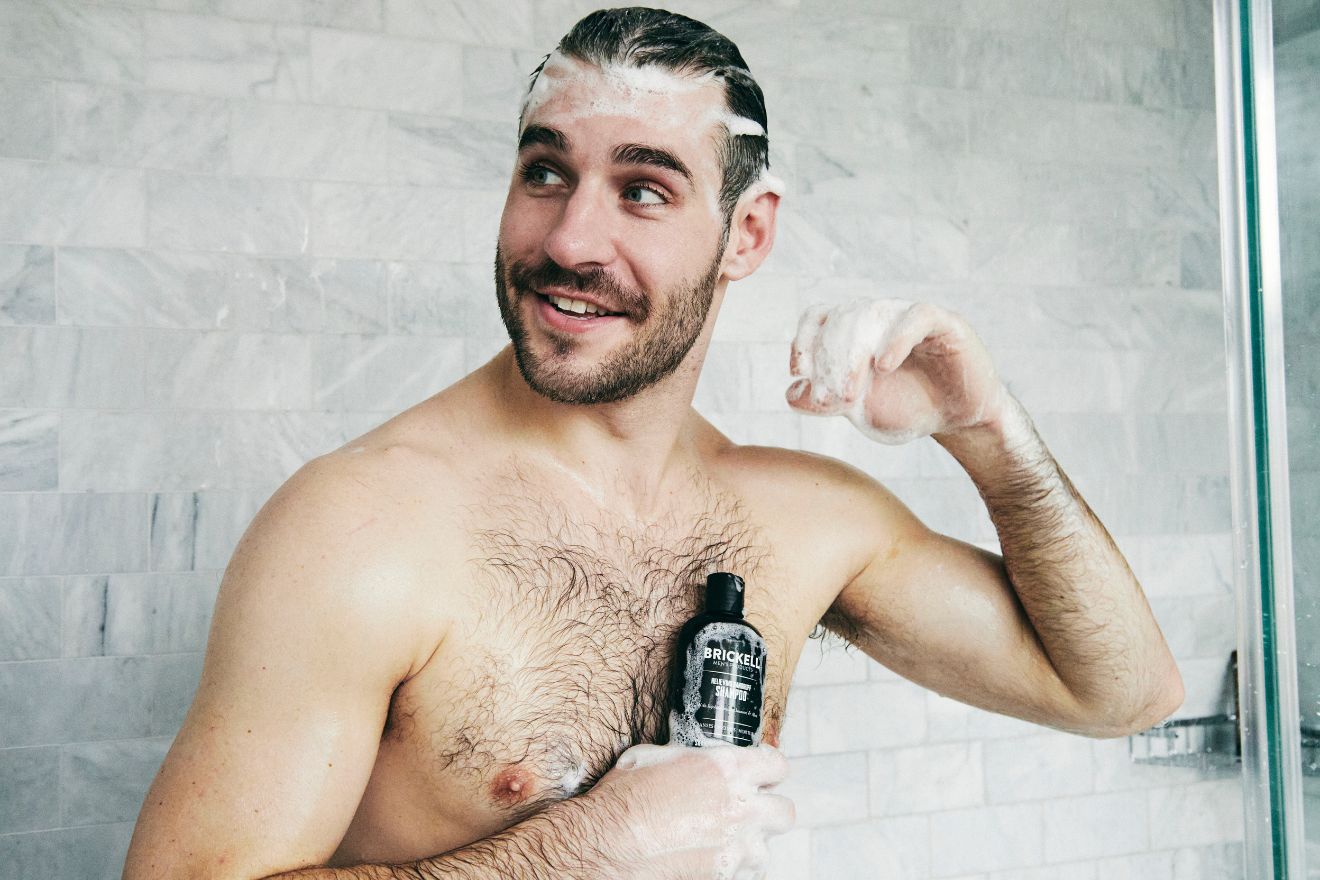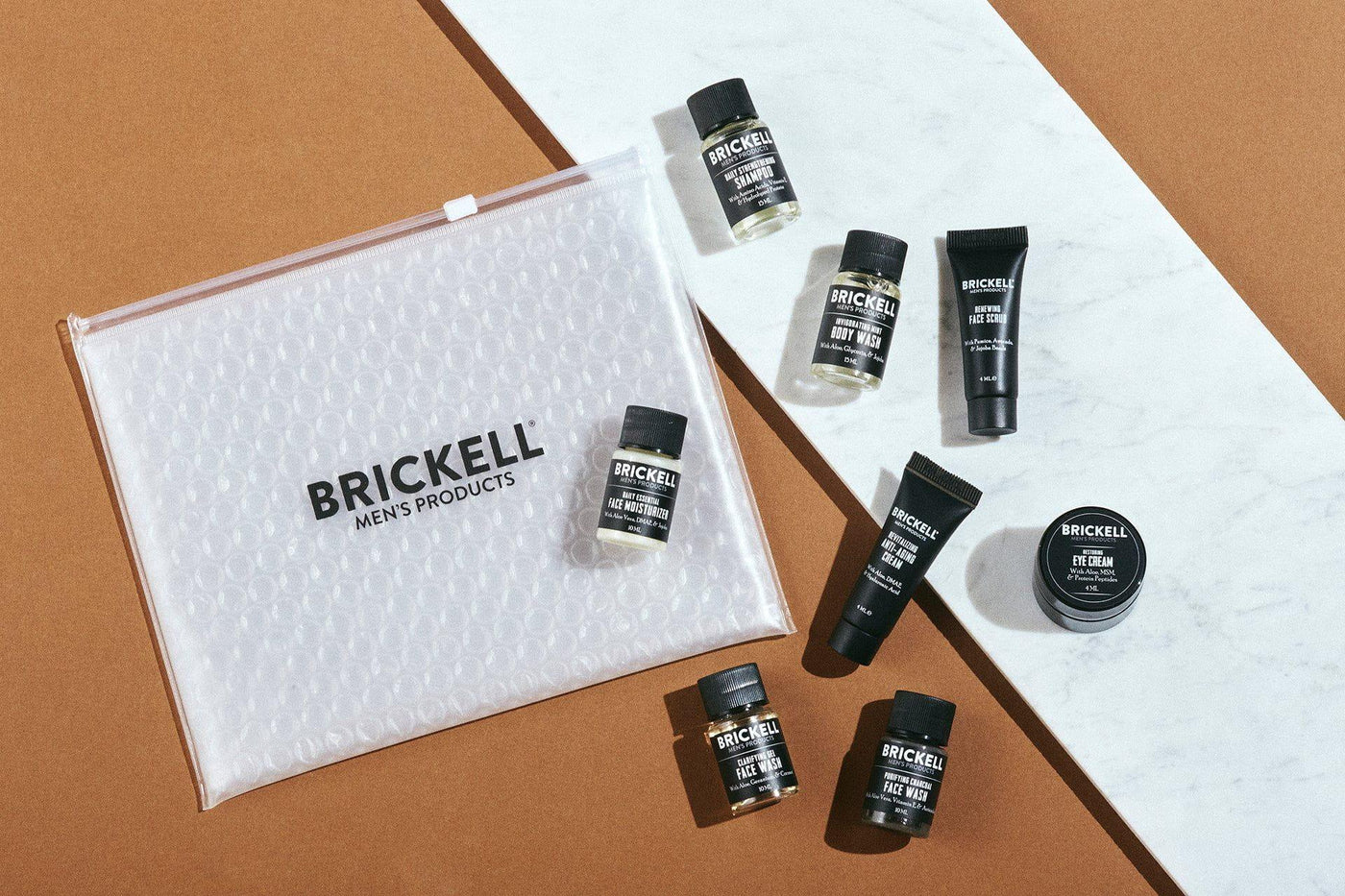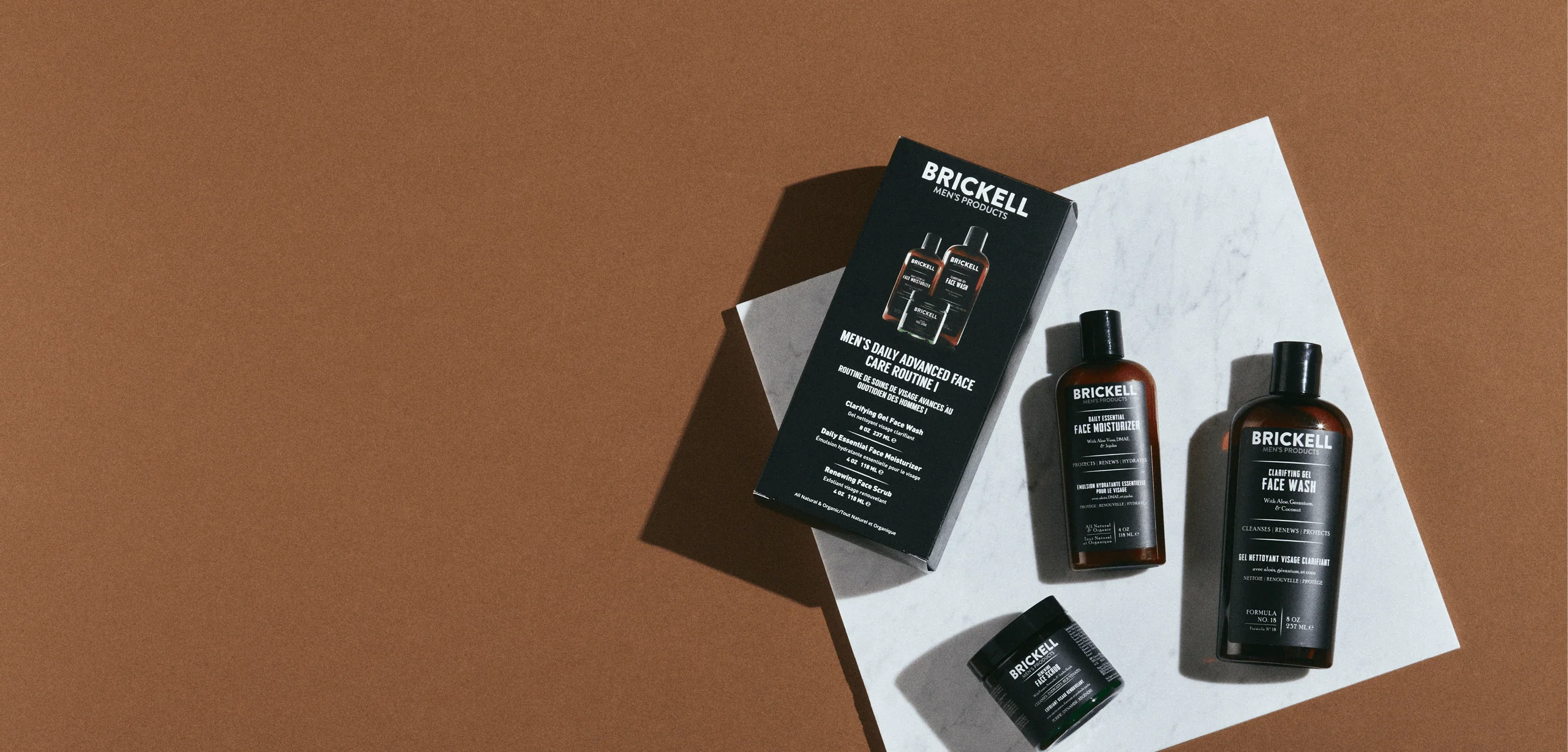The Grooming Manual
What Is Dandruff and How to Get Rid of It: Causes and Cures

Dandruff is flaky, itchy, and embarrassing. No good. And for too many guys, it’s a constant problem. But what is dandruff? Is getting dandruff normal?
Well, it turns out that being male is a risk factor. Some researchers even believe that male hormones are partially responsible for it.
So with dandruff being so common amongst men, it isn’t something you should be ashamed of. Millions of guys develop these unfortunate flakes from time to time. It’s just part of life.
Is dandruff contagious?
Dandruff isn’t serious, contagious, or bad for your health. But it can be embarrassing, chronic, and annoying.
Fortunately, you can learn how to manage dandruff and solve this common issue. Even if your current battle with hair flakes is frustrating you, these effective methods will help you treat the root causes of dandruff.
Dandruff Symptoms
Not only is dandruff bad for your confidence, but it’s also a sign that your skin is suffering. This problem develops when the skin becomes so irritated and oily that pieces can’t help but dry out and break off. It’s incredibly common, and that’s why most people know what dandruff looks like whether they’ve put a name to it or not. No one likes seeing or having those light yellow or white flakes on their shoulders, in their hair, or anywhere else for that matter.
Some of the most commonly experienced dandruff symptoms among men include:
- Itchy scalp
- Flaking skin
- Constant discomfort
- Fallaway pieces of skin in the hair and on the shoulders.
Why Do I Have Dandruff? Where Does It Come From?
To treat dandruff properly, you first need to understand what is causing it. Here are the common culprits behind flakes and dandruff.
Although there are many reasons for dandruff, most cases occur the same way - through an imbalance of oily and dry scalp conditions.
Knowing what causes dandruff can help you better manage it and keep your scalp healthy. Take a look at our simple breakdown of how common types of dandruff develop below.
Fungal Dandruff
Most dandruff-sufferers wonder if dandruff is caused by a germ or some type of bacteria. In most cases, dandruff is caused by the excessive buildup around your hair follicles of a common yeast-like fungus called Malassezia globosa.
Another common yeast that can bring on dandruff is pityrosporum orbiculare. Since it feeds on skin oils, it tends to cause dandruff in guys with oily scalps.
Even though one or both of these are found on most people’s scalps, they don’t always cause dandruff. Why not?
The problems start when fungal growth becomes excessive. The fungus feeds off of sebum, your skin’s natural oil. It’s the same oil your scalp secretes to keep your hair shiny and healthy.
But when you have too much hair and scalp oil - and too many fungi feeding on that oil - you get fungal dandruff.
Some of the byproducts that these fungal friends excrete can irritate your scalp. It doesn’t happen to everyone, but for guys with sensitive skin the results can be dryness, itch, and that telltale flaking you associate with fungus dandruff.
Dandruff Due to Dry Scalp
If your skin is naturally dry or sensitive, you may struggle with regular bouts of dandruff. A lack of moisture can lead to an imbalance in your scalp’s microbiome that makes these flakes more likely to occur. Read more on how to repair damaged and dry hair in men.
Dandruff Due to Oily Scalp
Oily skin is another common culprit. Since the fungi that cause most dandruff feed on sebum, your oily scalp is a smorgasbord for them. And the result is dandruff.
In some cases, guys with oily skin can develop especially severe, really bad dandruff, called seborrheic dermatitis. If your scalp is red, greasy, and covered in white or yellow flakes, this is probably what you’re dealing with. The condition can cause similar problems elsewhere on your body - wherever there are lots of oil secreting glands.
Dandruff from Bad Hair Care Habits
Washing your hair too often strips away natural oils and leaves your hair dehydrated. But the opposite isn’t better. Not washing your hair enough allows for excessive oil accumulation. That is a risk factor for excessive dandruff since the yeast and fungi that cause flakes are hungry for your scalp oil.
Shampoo is great because it removes dirt and oil from your hair and scalp. But your scalp needs some natural oil to keep it moisturized, itch-free, and healthy.
So shampooing - especially with a harsh product - is a double edged sword. You stay clean and reduce oil, but you also strip away the moisture your scalp needs to stay flake-free.
Showering with scalding hot water is hard on your hair, scalp, and skin too. While it won’t cause hair dandruff on its own, it can worsen the problems that come along with dandruff including dehydration and irritation.
Winter Dandruff
Cold, dry air cannot cause hair dandruff by itself. That’s because bad dandruff is usually instigated by fungal growth on your scalp.
However, several factors converge to aggravate dandruff problems in men during the winter. The dry conditions sap your scalp of moisture. So does indoor heating - which keeps you warm but dries out the air.
Even if you use a humidifier at home to improve conditions, you’re still going to have to deal with dry air for several months - and a potentially related fungal dandruff problem.
Dandruff Due to Certain Skin Condition
Lastly, we have a category of types of dandruff that is often overlooked - symptomatic dandruff. Certain illnesses and diseases are known to dry out the scalp and make it more prone to flaking. Psoriasis, for example, accelerates skin cell turnover, causing silvery scales to develop under the hair. Eczema is also notorious for its itchy, drying effects on skin. It's not uncommon for an individual with psoriasis, eczema, or seborrheic dermatitis to experience hair dandruff alongside more well-known symptoms.
How to Manage Dandruff
First, understand your hair and scalp. If dryness is your issue, focus on hydrating your hair and scalp and preventing dehydration throughout the day.
It also helps to identify the best - and worst - ingredients in most common dandruff shampoos. That way you can make a smart choice about which products you choose.
Avoid These Common Dandruff Shampoo Ingredients
Some brands make dandruff shampoo with harsh ingredients that we do not use or recommend, since “synthetic cosmetics lead to various side effects such as toxicity to the eye, over drying of hair and deposition of salt on the hair shaft.”
Selenium Sulfide
While this ingredient can reduce scalp itching and slow the growth of dandruff-causing yeast, it comes at a significant cost. Research shows that selenium sulfide’s “side effects include skin irritation, dry skin, oily or dry hair or temporary hair loss.” Another study noted that “excessive oiliness after use of this agent has been reported in many patients as adverse drug effect.”
Zinc Pyrithione
This antimicrobial and antifungal agent helps control acne and fungal dandruff, but also stings the eyes, mouth, and nose and can cause reactions of burning and redness.
Salicylic Acid
An ingredient common in acne controlling products, salicylic acid appears in some anti-dandruff shampoos too. It works by eliminating dead skin cell buildup. However, it can also exacerbate a dry skin problem, produce a burning sensation, and cause redness.
Coal Tar
Though widely used to treat dandruff, “the staining properties, odor and mess in using tar” make it a subpar choice for your hair.
The Best Natural Dandruff Shampoo Ingredients
Before you go the scorched earth route, opt for a gentler product that is still effective. These are some of the most effective natural ingredients that fight hair dandruff:
Jojoba Oil
Now that you know what causes dandruff in hair, what are you going to do about it? Hopefully not just sit back and let the flakiness ruin your first impressions.
Brickell offers a diverse catalog of products designed to target the types of dandruff guys struggle with most.
The ones we're showing you below include jojoba oil - a powerful ingredient that can rebuild the scalp’s natural protective cushion to prevent overgrowth in dandruff-causing bacteria.
Relieving Dandruff Shampoo for Men
This dandruff shampoo for men is suitable for hair dandruff of all kinds. It's been proven to reduce flakes without stripping away the essential moisture your skin needs. Works well with:
Classic Firm Hold Gel Pomade for Men
Whatever your cause of dandruff may have been, our gel pomade for men can help lock in the relief you get from our dandruff shampoo. The pomade’s strong hold will keep your hair looking smooth and neat, no matter how windy it gets outside.
Aloe Vera
We know that irritation is what causes dandruff in hair for many men. That's why Brickell crafts products with aloe vera - we love this ingredient's dual ability to support and soothe.
Revitalizing Hair & Scalp Conditioner for Men
Bad dandruff on scalp and hairline areas is no match for this conditioner for men. It soothes the scalp with natural oils, while simultaneously promoting hair growth.
Relieving Hair Care Routine
Our men's relieving hair care routine is quite possibly the best dandruff shampoo and conditioner combination to ever exist. Its combination of aloe, borage oil, and avocado oil is extremely effective against excessive dandruff and dryness.
Argan Hair Oil
Brickell's argan oil for hair is exactly what you need to keep your scalp moisturized and protected from damage on an ongoing basis.
Tea Tree Oil
Another scalp soother, tea tree oil relieves the skin, smells great, and keeps dandruff germ growth to a minimum. Find it in:
Daily Revitalizing Men's Hair Care Routine
Our men's hair care routine contains a blend of cleansing ingredients that work together to tackle sudden dandruff and itchy scalp skin.
Daily Strengthening Shampoo for Men
In the market for a shampoo for men? Let us save you some time searching by recommending this one. Our formula's potent, natural ingredients leave hair looking fuller, healthier, and better protected against dandruff. Works well with:
Styling Clay Pomade for Men
This clay pomade for men is like the icing on the cake for your hair care routine. Use it not only to style but also to condition and encourage hair growth without irritation.
Ziziphus Joazeiro Bark Extract
Although its name is a bit of a mouthful, this vitamin-rich ingredient possesses antibacterial and antifungal properties that calm and relieve the scalp from fungal dandruff-related irritation, itching, and flaking. It’s derived from the Ziziphus Joazeiro tree - native to Brazil - which has been researched for its effectiveness against both women's and men's dandruff for years.
Relieving Dandruff Shampoo for Men
We've made it clear by now that there are many reasons for dandruff. A solution made to treat them all, our dandruff shampoo for men reduces flakes and soothes dry scalps of all types.
Strong Hold Texturizing Pomade for Men
Brickell's texturizing pomade for men leverages an intelligent mix of ingredients to nourish your hair down to the roots while keeping it cleanly styled.
Hair Care Tips for Guys with Dandruff
For the best results, massage your scalp as you work the shampoo through your hair. Wait 2-3 minutes before rinsing thoroughly - leaving residue in your hair won't help your men's dandruff problem.
Shampoo Less Often
If you wash your hair daily, try switching to every other day or even less. Shampoo - even a gentle formula - removes some of the natural oils on your hair and scalp that help seal in moisture. Cutting back on shampoos might be a gradual process. Over time, your hair will produce less and less oil, meaning for men, dandruff caused by excess oil will subside.
If dryness is your main concern, over-washing will only worsen things. We recommend you use our Relieving Dandruff Shampoo 3-4 times each week depending on your needs.
Use Conditioner
Use a hydrating conditioner with nutrients that soothe the scalp and promote healthy hair growth. This will prevent the excessive dryness and irritation that put you at risk for out of control, excessive dandruff.
If you have severely dry skin you may want to use conditioner daily but shampoo only every few days. Find what works for you and then stick to that hair care routine.
Newsflash: Hair conditioner is not just for men with long hair. Even if you’re rocking short hair, you will have healthier, better looking hair if you use conditioner. It keeps your scalp healthy and reduces the chance of flakes appearing.
Make sure to choose a conditioner with ingredients that promote scalp moisture, lock in hydration, and rebalance your skin after using hair products. These include borage oil (which contains omega-6 fatty acids), avocado oil, aloe, and peppermint - all of which you’ll find in our Revitalizing Hair Conditioner.
Skip the Harsh Ingredients
Not every cause of dandruff in hair is easy to identify at first. Aside from fungus dandruff, many men have hair care products to blame for their problem. We recommend trying gentle, non-allergenic styling formulas like these to see if there's any difference in your dandruff yeast production.
Styling Hair Gel for Men
Put all types of dandruff in hair to bed in style with this hair gel for men. Its non-irritating, non-drying, flake-free formula is an asset for guys who want a head of hair that feels as good as it looks.
Shaping Paste Pomade for Men
Sudden dandruff and itchy scalp? You don't need to compromise on styling products. Our pomade for men does a better job than the average formula while enriching hair with everything it needs to shine.
Sculpting Hair Glue for Men
We created this hair glue for men to stand up to life's rigorous stressors - count on it for a strong hold and medium gloss finish that lasts all day. Rich in antioxidants, the formula is suitable for all types of dandruff and trusted by countless Brickell customers for good reason.
Flexible Hold Wax Pomade for Men
Brickell's pomade for men defines what it means to be a gentle and strong styling product. You can use it to shape, wave, and mold your hair without fear of irritation or dryness. Looking great has never been so easy or felt so good.
What About Beard Dandruff?
Men's dandruff can ravage your facial hair too. An itchy, flaky beard is problematic, but you can use the same dandruff shampoo on your face as you do on your head.
Another excellent way to control dryness and flakes is with beard oil. Ours is made with jojoba and argan oils - they hydrate the skin, give your facial hair a healthy shine, and prevent dryness and flakes.
Read more on how to get rid of beard dandruff here.
Top Picks for Beard Dandruff
For some men dandruff isn't just an issue of the scalp. Guys are unfortunate enough to have to deal with another kind - bad dandruff flakes from facial hair. Here are a few products that can help:
Beard Oil
Our Beard Oil softens and conditions your beard for a full, thick, and healthy look. Its natural ingredients are great for soothing and hydrating the itchy, flaky skin underneath your beard and keeping its discomfort at bay.
Renewing Face Scrub for Men
Brickell's face scrub for men exfoliates deeply to rid the skin of any oil and impurities that may cause irritation.
Instant Relief Men’s Aftershave
Whether you've got the worst dandruff in the world or are simply prone to irritation, this after shave has a soothing nature that’s sure to help.
Consequences of Ignoring Dandruff: Why It Matters
Have you been dealing with really bad dandruff? Don't ignore it! Bad dandruff flakes can indicate serious health problems like psoriasis, eczema, or a fungal infection. In the last case, fungal dandruff doesn't go away as easily as the regular kind and requires special treatment. This includes using a combination of antifungal shampoos and other topical creams or sprays.
In addition to treating the condition, there are also things you can do on a daily basis to prevent it from coming back. Make sure you’re using a dandruff shampoo regularly, and use conditioners with zinc pyrithione or salicylic acid in them.
It's also important to pay attention to how you're drying your hair after a shower. Since fungus thrives in warm, damp environments, it’s best not to rub or massage the scalp with a towel when drying your hair. Instead, use a blow dryer and keep it on the coolest setting.
When to See a Doctor
At some point, it will be time to stop asking yourself 'why do I have so much dandruff?' and start doing something about it.
Even the worst dandruff can be managed with over-the-counter dandruff shampoos, containing zinc, selenium, or ketoconazole, but fungus dandruff will require professional help.
We recommend taking every step you can to embrace the principles of proactive management that we've gone over today and then consult your dermatologist should severe dryness and flaking persist or worsen in any way.
Prevent and Manage Dandruff with a Smart Hair Care Routine
Now for the key takeaways: Is dandruff bad? It sucks. But it doesn’t have to be a recurring nightmare for you. Use these tips, prevent flakes with a good hair care routine that includes natural dandruff shampoo, and avoid the bad habits that can lead to a dandruff problem. That way you’ll always be proud of your luscious locks and won’t have to worry about unwanted flakes.
Brickell has everything you could possibly need to keep your hair and face at their best. Order our FREE sample kit to try these game-changing products for yourself today.

